Brain abscess is the accumulation of inflammation in a certain area of the brain due to trauma or infection. Brain abscess is a serious disease that causes a high level of vital risks and can cause many different permanent problems in the human body.
- What Causes a Brain Abscess?
- Symptoms of Brain Abscess
- Brain Abscess Treatment
- Prevention of Brain Abscesses
- Aspiration (Cleaning) of Brain Abscess with Burr-Hole
- How is a Cerebral Abscess Diagnosed?
- What Are The Complications of Brain Abscess?
- When Should I Call My Healthcare Provider?
- Who Is at Risk for Brain Abscess?
- What Are The 4 Stages Of an Abscess?
- Is It Possible to Fully Recover from Brain Abscess?
- What Age Do People Get Brain Abscesses?
- Brain Abscess and Craniotomy
- What is the survival rate of a brain abscess?
- What is the most common early symptom of a brain abscess?
Bacterial infections are the most common cause of brain abscesses. However, depending on the person’s immune system or the disease to which he is exposed, viruses and fungal diseases can also cause brain abscesses.
What Causes a Brain Abscess?
The most common cause of brain abscesses is the spread of infection from another part of the body, such as the ears, sinuses, lungs, or heart. This can happen through the bloodstream or through direct contact with the brain tissue. Other causes of brain abscesses include:
- Head injury
- Brain surgery
- Dental infection
- Mastoiditis (infection of the mastoid bone behind the ear)
- Sinusitis (infection of the sinuses)
- Otitis media (infection of the middle ear)
- Meningitis (inflammation of the meninges, the membranes that surround the brain and spinal cord)
- Endocarditis (inflammation of the inner lining of the heart)
Risk Factors for Brain Abscesses
Certain people are at increased risk of developing a brain abscess, including:
- People with weakened immune systems, such as those with HIV/AIDS, diabetes, or cancer
- People who have recently undergone brain surgery or dental procedures
- People with chronic infections, such as ear infections or sinusitis
- People who have had a head injury
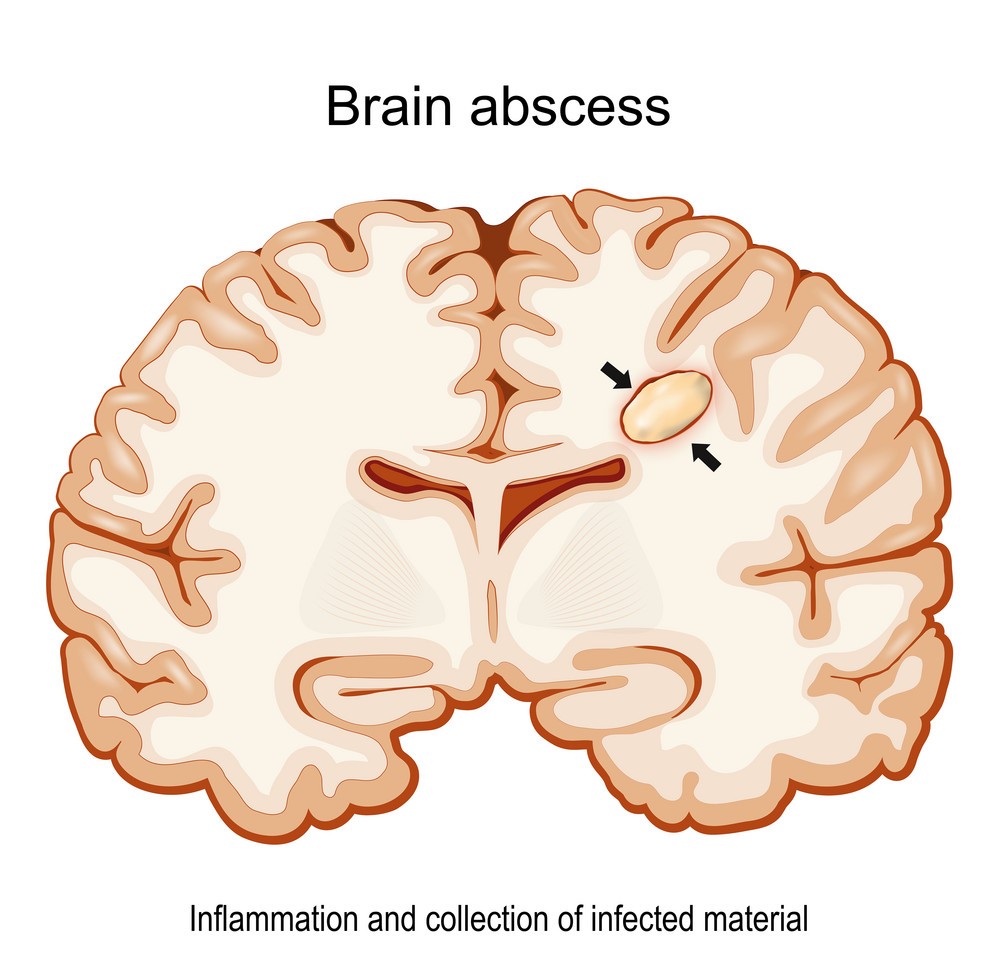
Symptoms of Brain Abscess
This bacterial infection that causes a brain abscess may have developed directly in the brain where they were found. However, in addition to this, the transfer of the infection that occurs in another part of the body, such as heart and liver infections, ear infections, sinusitis, and dental infections, directly to the brain through blood – vessels or in cases where it is in the head can also cause brain abscess formation. Brain abscess symptoms often appear slowly.
In some special cases, sudden symptoms and even seizures may occur due to the region where the brain abscess is located. Symptoms such as intense headache, vision problems, difficulty in speaking, confusion, irritability, pressurized vomiting, high fever, sensory loss and tingling sensation, neck stiffness, and seizures may occur due to brain abscess. Apart from these, swelling can be seen in the soft area known as fontanelle located on the top of the head in infant patients.
The symptoms of a brain abscess can vary depending on the location and size of the abscess. Some common symptoms include:
- Headache
- Fever
- Stiff neck
- Confusion
- Nausea and vomiting
- Seizures
- Weakness or paralysis
- Changes in vision or hearing
- Loss of consciousness
Brain Abscess Treatment
Brain abscesses can disrupt the blood circulation of the brain due to the swelling they create in the area where they are located, and in some cases, they can even burst, causing more serious problems. Although surgical techniques, antibiotic treatments, and imaging techniques have been developed today, brain abscesses seriously threaten human life due to the nervous system infection they cause. Especially thanks to antibiotic therapies, the incidence of brain abscesses developed due to bacterial reasons has decreased and disease control has become more accessible. However, even if drug treatment is applied, surgical techniques that enable the removal of the abscess from the region called surgical drainage, maintain their importance in the treatment of brain abscess.
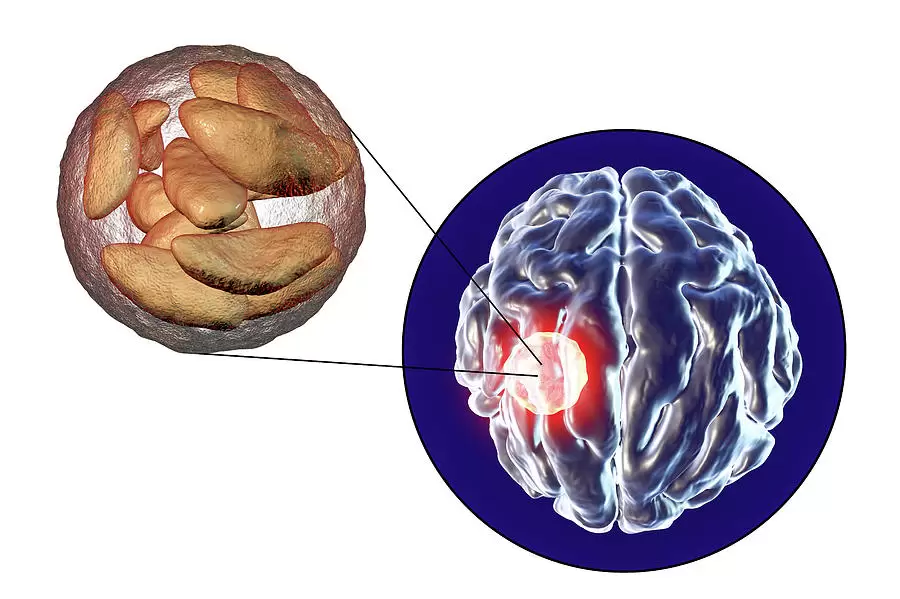
Prevention of Brain Abscesses
There are a number of things that you can do to reduce your risk of developing a brain abscess, including:
- Practice good oral hygiene to prevent dental infections.
- Treat ear infections and sinus infections promptly.
- Avoid contact with people who are sick with infectious diseases.
- Wear a helmet when participating in sports or other activities that carry a risk of head injury.
- If you have a weakened immune system, take steps to protect yourself from infection, such as washing your hands frequently and avoiding contact with sick people.
Aspiration (Cleaning) of Brain Abscess with Burr-Hole
One of the most used techniques in the treatment of brain abscesses is the Burr Hole method. Burr Hole is the name given to the hole opened in the skull for the intervention to reduce the pressure in the brain. In aspiration with the Burr Hole method, first, the area where the brain abscess is located is determined exactly by computed tomography.
According to the location of the brain abscess, from which point of the skull the entrance will be made and the depth of the brain abscess is calculated. After the necessary planning is done, a needle called a biopsy needle is passed through the skull and proceeded to the abscess, usually under local anesthesia. With this needle, the area where the abscess is located is drained and cleaned.
The advantages of the Burr Hole method can be listed as the margin of error of the aspiration is very small, it can be applied with local anesthesia, and it provides the shortest way to reach the abscess in the brain and causes as little damage to the brain tissue as possible. It is also a practical method in emergency conditions and the absence of necessary equipment.
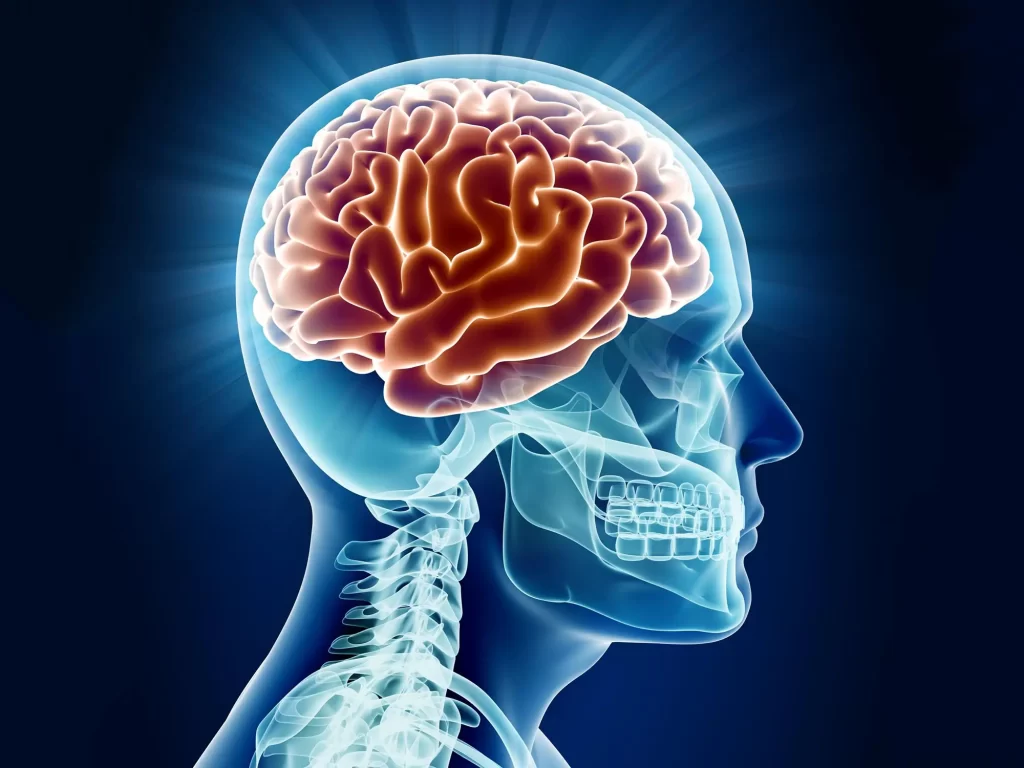
How is a Cerebral Abscess Diagnosed?
A cerebral abscess is a pus-filled swelling in the brain that can be caused by a bacterial or fungal infection. It is a serious medical condition that requires immediate medical attention. The symptoms of a cerebral abscess can vary depending on the location and size of the abscess, but some common symptoms include headache, fever, stiff neck, confusion, nausea and vomiting, seizures, weakness or paralysis, and changes in vision or hearing.
If you are suspected of having a cerebral abscess, your doctor will likely order a series of tests to diagnose the condition. These tests may include:
- Neurological exam: Your doctor will assess your neurological function by checking your mental status, reflexes, coordination, and strength.
- Blood tests: Blood tests can be used to check for signs of infection, such as elevated white blood cell count and C-reactive protein levels.
- Imaging tests: Imaging tests, such as a CT scan or MRI scan, can be used to identify the location and size of the abscess.
- Lumbar puncture: A lumbar puncture, also known as a spinal tap, is a procedure in which a needle is inserted into the lower back to collect a sample of cerebrospinal fluid (CSF). CSF is the fluid that surrounds and protects the brain and spinal cord. CSF analysis can be used to look for signs of infection, such as elevated white blood cell count and elevated protein levels.
If the imaging tests or lumbar puncture results suggest a cerebral abscess, your doctor may also order a culture of the abscess fluid to identify the specific bacteria or fungus that is causing the infection. This information can be used to select the most appropriate antibiotics for treatment.
Early diagnosis and treatment of a cerebral abscess is important to prevent complications, such as brain damage, seizures, and death. If you have any concerns about your risk of developing a cerebral abscess, or if you are experiencing any of the symptoms listed above, please talk to your doctor.
In addition to the tests listed above, your doctor may also order other tests to diagnose a cerebral abscess or to rule out other possible causes of your symptoms. These tests may include:
- Electroencephalogram (EEG): An EEG is a test that measures the electrical activity of the brain. It can be used to detect seizures or other abnormalities in brain function.
- Electromyography (EMG): An EMG is a test that measures the electrical activity of muscles. It can be used to detect nerve damage or muscle weakness.
- Angiogram: An angiogram is an X-ray of the blood vessels in the brain. It can be used to look for blood clots or other abnormalities in the blood vessels.
What Are The Complications of Brain Abscess?
A brain abscess is a pus-filled swelling in the brain that can be caused by a bacterial or fungal infection. It is a serious medical condition that requires immediate medical attention. Without treatment, a brain abscess can lead to a number of complications, including:
- Brain damage: A brain abscess can damage the brain tissue surrounding the abscess. This can lead to a variety of neurological problems, such as weakness, paralysis, seizures, and changes in vision or hearing.
- Seizures: Seizures are a common complication of brain abscesses. They occur when there is abnormal electrical activity in the brain. Seizures can be dangerous and can lead to further brain damage.
- Hydrocephalus: Hydrocephalus is a condition in which there is too much cerebrospinal fluid (CSF) in the brain. CSF is the fluid that surrounds and protects the brain and spinal cord. Hydrocephalus can cause pressure to build up in the brain, which can lead to brain damage.
- Coma: A coma is a state of deep unconsciousness. It can be caused by a variety of factors, including a brain abscess. A coma can be life-threatening.
- Death: A brain abscess can be fatal, especially if it is not treated promptly.
Other possible complications of brain abscess include:
- Meningitis: Meningitis is an inflammation of the meninges, the membranes that surround the brain and spinal cord.
- Ventriculitis: Ventriculitis is an inflammation of the ventricles, the fluid-filled cavities in the brain.
- Septic shock: Septic shock is a life-threatening condition that occurs when the body’s response to infection damages its own organs and tissues.
- Thrombosis: Thrombosis is the formation of a blood clot in a blood vessel. A blood clot in the brain can lead to a stroke.
Early diagnosis and treatment of a brain abscess is important to prevent these complications. If you have any concerns about your risk of developing a brain abscess, or if you are experiencing any of the symptoms listed above, please talk to your doctor.
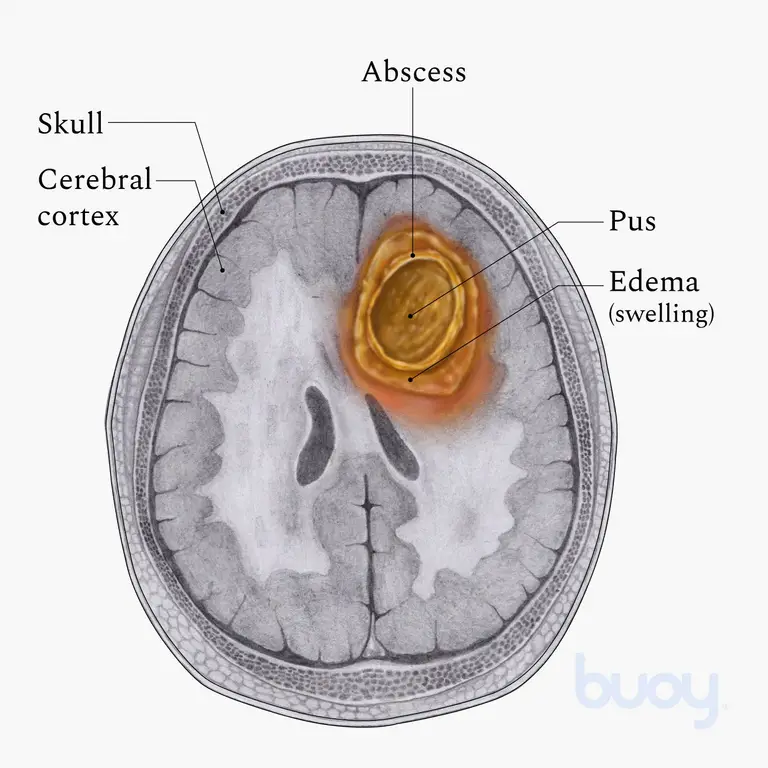
When Should I Call My Healthcare Provider?
You should call your healthcare provider if you are experiencing any of the following symptoms:
- A fever of 100.4 degrees Fahrenheit (38 degrees Celsius) or higher
- Severe headache
- Stiff neck
- Confusion or mental changes
- Seizures
- Weakness or paralysis
- Changes in vision or hearing
- Loss of consciousness
You should also call your healthcare provider if you have any of the following conditions and develop new symptoms:
- Weakened immune system, such as due to HIV/AIDS, diabetes, or cancer
- Recent brain surgery or dental procedures
- Chronic infections, such as ear infections or sinusitis
- Head injury
If you are unsure whether or not you should call your healthcare provider, it is always better to err on the side of caution and call. Your healthcare provider can assess your symptoms and determine if you need to be seen in person.
Here are some additional tips on when to call your healthcare provider:
- If you are experiencing a new or worsening symptom, call your healthcare provider.
- If you have any concerns about your health, call your healthcare provider.
- If you are unsure whether or not you should call your healthcare provider, call.
Who Is at Risk for Brain Abscess?
People who are at risk for brain abscesses include:
- People with a weakened immune system, such as those with HIV/AIDS, diabetes, or cancer
- People who have recently undergone brain surgery or dental procedures
- People with chronic infections, such as ear infections or sinusitis
- People who have had a head injury
- People who use intravenous (IV) drugs
- People with congenital heart defects
- People with cyanotic heart disease
- People with liver or kidney disease
- People with lung abscess and bronchiectasis
Brain abscesses can occur at any age, but they are most common in children and adults aged 20 to 50.
If you have any of the risk factors listed above, it is important to be aware of the signs and symptoms of a brain abscess and to seek medical attention immediately if you experience any of them.
Here are some tips on how to reduce your risk of developing a brain abscess:
- Practice good oral hygiene to prevent dental infections.
- Treat ear infections and sinus infections promptly.
- Avoid contact with people who are sick with infectious diseases.
- Wear a helmet when participating in sports or other activities that carry a risk of head injury.
- If you have a weakened immune system, take steps to protect yourself from infection, such as washing your hands frequently and avoiding contact with sick people.

What Are The 4 Stages Of an Abscess?
The four stages of abscess formation are:
- Inflammation: This is the initial stage of abscess formation and is characterized by the recruitment of white blood cells to the site of infection. The white blood cells attempt to fight off the infection, but if they are unable to do so, the infection will progress to the next stage.
- Suppuration: This stage is characterized by the formation of pus, which is a collection of dead white blood cells, bacteria, and other debris. The pus accumulates at the site of infection and forms a pocket or abscess.
- Maturation: During this stage, the abscess wall thickens and the pus becomes more concentrated. The abscess may also increase in size.
- Rupture: If the abscess is not drained, it may eventually rupture, releasing the pus into the surrounding tissues. This can lead to the spread of infection and more serious complications.
The rate at which an abscess progresses through these stages varies depending on the type of infection, the location of the abscess, and the patient’s overall health. Some abscesses may develop rapidly, while others may take weeks or even months to form.
Antibiotics and surgery are the two main treatments for abscesses. Antibiotics are used to kill the bacteria that is causing the infection, while surgery is used to drain the abscess.
If you think you may have an abscess, it is important to see a doctor right away. Early diagnosis and treatment are essential to prevent complications, such as the spread of infection and blood poisoning.
Is It Possible to Fully Recover from Brain Abscess?
Yes, it is possible to fully recover from a brain abscess. With early diagnosis and treatment, the prognosis for brain abscess is good. However, if the abscess is not diagnosed and treated promptly, it can lead to serious complications, such as brain damage, seizures, and death.
The severity of the complications of a brain abscess depends on a number of factors, including the location and size of the abscess, the type of infection, and the patient’s overall health. Some people may experience only minor neurological problems, while others may develop severe complications, such as coma or death.
If you are diagnosed with a brain abscess, your doctor will develop a treatment plan to maximize your chances of recovery. Treatment may involve antibiotics, surgery, or a combination of both.
It is important to follow your doctor’s instructions and to report any new or worsening symptoms immediately. With prompt and effective treatment, most people with brain abscesses can make a full recovery.
Here are some tips for making a full recovery from a brain abscess:
- Follow your doctor’s instructions carefully.
- Take all of your medications as prescribed.
- Get plenty of rest.
- Eat a healthy diet.
- Avoid alcohol and tobacco.
- Attend all of your follow-up appointments.
What Age Do People Get Brain Abscesses?
Brain abscesses can occur at any age, but they are most common in children and adults aged 20 to 50.
In children, brain abscesses are often caused by the spread of infection from the ears, sinuses, or lungs. In adults, brain abscesses are more likely to be caused by head injury, brain surgery, or dental infection.
People with a weakened immune system, such as those with HIV/AIDS, diabetes, or cancer, are at increased risk of developing a brain abscess.
If you have any concerns about your risk of developing a brain abscess, talk to your doctor.
Here are some tips to reduce your risk of developing a brain abscess:
- Practice good oral hygiene to prevent dental infections.
- Treat ear infections and sinus infections promptly.
- Avoid contact with people who are sick with infectious diseases.
- Wear a helmet when participating in sports or other activities that carry a risk of head injury.
- If you have a weakened immune system, take steps to protect yourself from infection, such as washing your hands frequently and avoiding contact with sick people.
Brain Abscess and Craniotomy
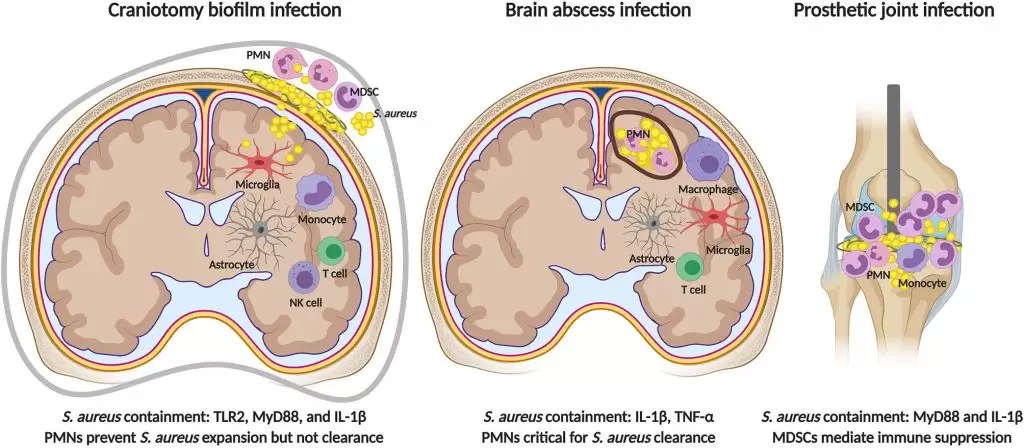
Another technique in the treatment of brain abscesses is craniotomy or craniectomy. In craniotomy, a piece of bone is removed from the skull and the abscess is removed from the brain. Depending on the patient’s condition, the surgeon decides whether to perform the craniotomy under general anesthesia or while the patient is awake.
During a craniotomy, which is mostly performed under general anesthesia, the patient’s head is fixed with a nail head. The skull bone tissue closest to the brain abscess is determined and marked by the surgeon. After the scalp in the relevant area is opened, the skull is opened with a device called a drill device.
After this point, the dura, located in the outermost layer of the brain, is reached. After the cerebral cortex is opened properly, the brain abscess is reached within the brain tissue. Finally, the inflammation-filled brain abscess is drained. A craniotomy can be performed quickly and in a more controlled manner thanks to the developing surgical technologies. In this way, surgical complications are greatly reduced compared to the past.
What is the survival rate of a brain abscess?
The survival rate of a brain abscess depends on a number of factors, including the location and size of the abscess, the type of infection, the patient’s overall health, and the timeliness and effectiveness of treatment.
With early diagnosis and treatment, the survival rate of brain abscesses is high, at around 90%. However, if the abscess is not diagnosed and treated promptly, the survival rate can drop to as low as 20%.
People with certain risk factors, such as a weakened immune system or a recent head injury, are at higher risk of death from a brain abscess.
If you are diagnosed with a brain abscess, your doctor will develop a treatment plan to maximize your chances of survival. Treatment may involve antibiotics, surgery, or a combination of both.
It is important to follow your doctor’s instructions and to report any new or worsening symptoms immediately. With prompt and effective treatment, most people with brain abscesses can make a full recovery.
What is the most common early symptom of a brain abscess?
Fever
Stiff neck
Confusion
Nausea and vomiting
Seizures
Weakness or paralysis
Changes in vision or hearing

Vimfay International Health Services